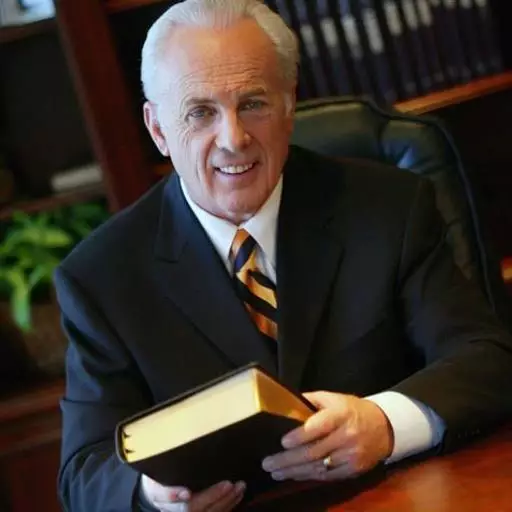John MacArthur has never been known to avoid political issues. He's spoken out clearly to explain what the Bible says about some of the most politically charged issues of the day — abortion, war, government, homosexuality, women's roles, etc. Have you ever seen his interviews with Larry King on CNN? John has never avoided politically incorrect subjects; he's always spoken clearly about biblical truth, whether it's popular or not, whether the setting is "appropriate" or not, in season and out of season.
However, it is true that John doesn't involve himself in politics, at least compared to some contemporary evangelicals. He's committed to two things in his ministry: the church's mandate from Christ (Matt. 28:18-20) and his God-given priority as a pastor/teacher (Eph. 4:11-16). Since God left the church on earth to make disciples (not Democrats or Republicans), John believes the best way a pastor can spend his time, energy, and influence is by preaching God's Word. The proclamation of the gospel unleashes the power of God to produce the miracle of regeneration.
Apart from his commitment to those pastoral priorities, John has some further reservations about political involvement as a pastor.
First, political involvement requires time and energy from a pastor that should be spent on shepherding the flock of God. Life is short — there are only so many weeks, days, and hours — and a pastor must make every effort to redeem the time (Ps. 90:12; Eph. 5:16). He's a steward, charged by the Master for the administration of His truth, and he will give an account to the Lord of the church; and extensive political involvement is a distraction (1 Cor. 3:12-15; 4:1-5). He simply can't effectively shepherd his people when he's trying to be effective in politics. No one can serve two masters.
Second, effective politics requires co-belligerency to promote a common cause or resist a common enemy. When disparate groups take a similar position on an issue like abortion, it's in their political interest to rally together and unite their voices for greater influence. By its nature, co-belligerency involves compromises that dull the contrasts and accentuate the common ground. The spirit of co-belligerency is the opposite of what the Bible requires a pastor to be — a man of deep biblical conviction (Tit. 1:9). Men like that are disruptive to common political causes, especially among those who pervert or are indifferent to the gospel.
Third, political changes, at best, are only superficial and temporary. The reforms of one generation or administration are quickly undone by the reforms of the next. When a pastor spends very much of his time rallying his people for political causes, he keeps his attention — and the attention of his flock — fixed on the shifting sands, the changing winds, and the ebb and flow of the latest political trend. The gospel of Jesus Christ, however, is the bedrock of immutable truth, showing the way of eternal salvation. That's what all people need to be fixated on, pastor and congregation alike.
Fourth, political involvement can easily confuse the message of the church. Many unbelievers are totally confused by the testimony of the visible church. It's easy to excuse them for thinking the cause of Christ is about passing conservative legislation or championing social causes. The message of the church is that sinners can be reconciled to a holy God (2 Cor. 5:20-21). God has sent His beloved Son to redeem fallen, broken, condemned, and dying people, to turn His enemies into His friends, to adopt and love ragged, throw-away children and receive them into His kingdom. Political involvement undermines and confuses that clear and winsome message.
Fifth, political engagement often turns the church's mission field into the enemy. Political campaigns make this abundantly clear. Fueled by a righteous cause, each side wages war with the carnal weapons of this age, and each side demonizes the other, employing the sharpest (and sometimes the nastiest) rhetoric. That's not the mandate for the church. Instead, "Let your speech always be gracious, seasoned with salt, so that you may know how you ought to answer each person" (ESV). Those people out there may be the worst of sinners — you know, activist types — but such were some of you. And yet, God washed you, sanctified you, and justified you in the name of the Lord Jesus Christ and the Spirit of God (1 Cor. 6:9-11). The world may be the enemy of God, as you once were (Eph. 2:1-3), but they need to be reconciled to God, as you have been (Eph. 2:4-10). The world is our mission field.
It's not that it's wrong for a Christian to be involved in the political process. Christians in democratic countries have the opportunity to vote, and there are a number of God-fearing Christians throughout the world whom God has chosen to have political careers. But it is wrong for churches and pastors to lose sight of Christ's mandate in Matthew 28:18-20 and stray from the full-time work of making disciples. That's a mandate and a mission that John MacArthur, along with many other faithful pastors, takes very seriously.
For more information on the subject of Christians and politics, you might consider picking up a copy of Why Government Can't Save You, by John MacArthur.
This article originally appeared here at Grace to You.



